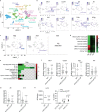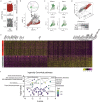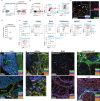Dermis resident macrophages orchestrate localized ILC2 eosinophil circuitries to promote non-healing cutaneous leishmaniasis
- PMID: 38030609
- PMCID: PMC10687111
- DOI: 10.1038/s41467-023-43588-2
Dermis resident macrophages orchestrate localized ILC2 eosinophil circuitries to promote non-healing cutaneous leishmaniasis
Abstract
Tissue-resident macrophages are critical for tissue homeostasis and repair. We previously showed that dermis-resident macrophages produce CCL24 which mediates their interaction with IL-4+ eosinophils, required to maintain their M2-like properties in the TH1 environment of the Leishmania major infected skin. Here, we show that thymic stromal lymphopoietin (TSLP) and IL-5+ type 2 innate lymphoid cells are also required to maintain dermis-resident macrophages and promote infection. Single cell RNA sequencing reveals the dermis-resident macrophages as the sole source of TSLP and CCL24. Generation of Ccl24-cre mice permits specific labeling of dermis-resident macrophages and interstitial macrophages from other organs. Selective ablation of TSLP in dermis-resident macrophages reduces the numbers of IL-5+ type 2 innate lymphoid cells, eosinophils and dermis-resident macrophages, and ameliorates infection. Our findings demonstrate that dermis-resident macrophages are self-maintained as a replicative niche for L. major by orchestrating localized type 2 circuitries with type 2 innate lymphoid cells and eosinophils.
© 2023. This is a U.S. Government work and not under copyright protection in the US; foreign copyright protection may apply.
Conflict of interest statement
The authors declare no competing interests.
Figures







Update of
-
Dermis resident macrophages orchestrate localized ILC2-eosinophil circuitries to maintain their M2-like properties and promote non-healing cutaneous leishmaniasis.Res Sq [Preprint]. 2023 Apr 5:rs.3.rs-2644705. doi: 10.21203/rs.3.rs-2644705/v1. Res Sq. 2023. Update in: Nat Commun. 2023 Nov 29;14(1):7852. doi: 10.1038/s41467-023-43588-2. PMID: 37066418 Free PMC article. Updated. Preprint.
References
Publication types
MeSH terms
Substances
Associated data
- Actions
Grants and funding
LinkOut - more resources
Full Text Sources
Molecular Biology Databases

